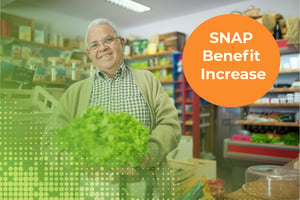SNAP retailers are key access points to healthy, nutritious foods for SNAP recipients. USDA announced a $25M investment for SNAP healthy incentives. This will help SNAP retailers provide coupons, promotions, or special discounts on healthy items like fruits and vegetables for SNAP recipients.
Maximizing Revenue with the USDA Summer EBT Program
The USDA’s new Summer Electronic Benefit Transfer (EBT) program provides retailers a unique opportunity to tap into a significant market segment and add to their revenue streams. The USDA initiative, aimed at closing the summer hunger gap for children, is not just a stride towards national nutrition and health; it's an opportunity for retailers to align their business strategies with community needs. Here's how store owners can make the most of the upcoming SNAP increases…
- Understanding the summer EBT Program:
The Summer EBT program, part of a broader effort to combat child hunger and improve diet quality during the summer months, will provide families with $120 per eligible child to purchase food at grocery stores, farmers markets, or other authorized retailers. With an estimated 21 million children set to receive these benefits in 35 states, all five U.S. territories, and four tribes, the program presents a substantial market for store owners.
- Stocking Up on the Right Products:
Existing EBT retailers should anticipate increased demand for nutritious food items, especially fruits, vegetables, and whole grains, as the program aims to support healthier diets. Ensuring your store has substantial stock of these items, possibly sourced from local producers to maintain freshness, and support the community, can position your store as the go-to place for SNAP recipients this summer.
- Training Staff and Ensuring Smooth Transactions:
With the influx of customers using EBT cards, staff training becomes crucial. Employees should be well-versed in handling EBT transactions, knowledgeable about eligible items, and prepared to offer assistance to shoppers unfamiliar with the process. A smooth, respectful, and efficient checkout experience can foster customer loyalty and positive word-of-mouth.
- Marketing and Community Engagement:
Retailers should consider tailored marketing strategies to attract EBT beneficiaries. This could include signage that indicates acceptance of EBT, promotional materials highlighting eligible products, or even workshops on budgeting EBT funds and cooking nutritious meals. Engaging with local community centers, schools, and health clinics to spread the word about the retailer's support for the summer EBT program can also widen the customer base. Did you know? You can purchase EBT signage on the goEBT shop.
- Partnering with Local Programs:
Collaborating with local summer meal sites or programs offering to-go or home-delivered summer meals can enhance the retailer's community presence and reputation as a business that cares about local health and well-being.
The Summer EBT program is more than a federal initiative; it's a community lifeline during the critical summer months. For retailers, it's an opportunity to align business growth with community service, ensuring that while they cater to a new customer base, they also contribute to the noble cause of ending child hunger. As this program takes root and expands, proactive and engaged retailers will not only see an uptick in their revenue but also in their role as vital pillars of community support and nutrition.





